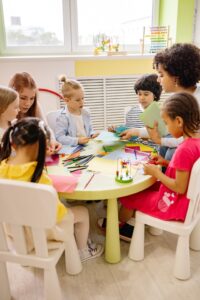Early childhood education is crucial for the growth and development of young children. Kindergarten provides a foundation for learning that can help set children on the path to success in school and beyond. In this article, we will explore how kindergarten can help a child’s early education.
First and foremost, kindergarten programs altona provides a structured learning environment that helps children develop important social and academic skills. Children learn how to work together in groups, share, and take turns, which are important skills for success in school and life. Kindergarten also helps children develop early literacy and numeracy skills, such as letter recognition, phonics, counting, and basic math concepts. In addition to academic skills, kindergarten provides opportunities for children to develop their emotional and social skills. Children learn how to express themselves, manage their emotions, and develop empathy for others. They also learn how to solve problems and negotiate with their peers, which are important skills for success in school and life.

Kindergarten also provides opportunities for children to engage in play-based learning, which is essential for their development. Play-based learning allows children to explore their environment, experiment with new ideas and concepts, and learn through hands-on activities. This type of learning is essential for young children, as it helps them develop their creativity, imagination, and problem-solving skills.Furthermore, kindergarten can help children develop a love for learning that can last a lifetime. When children are engaged in learning activities that are fun and exciting, they are more likely to develop a positive attitude towards learning. This can help children become lifelong learners, who are curious and eager to explore the world around them.
Kindergarten can also help children develop important language skills. Children who attend kindergarten are exposed to a rich vocabulary and language structure, which can help them develop their speaking and listening skills. Kindergarten teachers also use a variety of teaching methods, such as singing, storytelling, and role-playing, to help children develop their language skills.Kindergarten can also aid in the development of young children’s fine motor abilities. The tiny muscles of the hands, fingers, and wrists are used in fine motor skills. These abilities are necessary for activities like writing, drawing, and cutting with scissors. Through tasks like drawing, colouring, and cutting, kindergarten teachers provide students with the chance to hone their fine motor skills.

Furthermore, kindergarten can help children develop their gross motor skills. Gross motor skills involve the use of large muscles in the body, such as those used for running, jumping, and climbing. Kindergarten teachers provide opportunities for children to practice their gross motor skills through activities such as playing tag, running, and playing on the playground.Finally, kindergarten can help children develop a sense of independence and responsibility. Children learn how to take care of their belongings, follow rules and routines, and take responsibility for their learning. These skills are important for success in school and life, as they help children become responsible, self-reliant, and independent individuals.
In conclusion, kindergarten can provide a strong foundation for a child’s early education. It provides a structured learning environment that helps children develop important academic, social, emotional, and physical skills.
